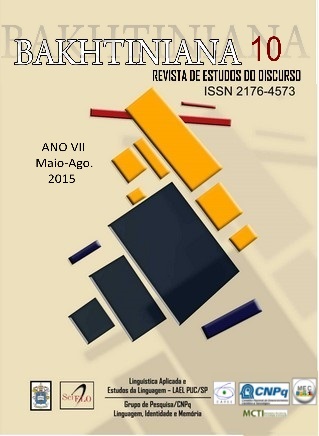O que poderia significar o “Grande Tempo”?
Mots-clés :
Grande tempo, Dialogismo, “Terceiro” na comunicaçãoRésumé
O Grande Tempo está presente na concepção de cultura e literatura de Bakhtin e na sua antropologia filosófica. Tomado como uma metáfora, o conceito poderia ser compreendido por meio de uma extensa gama de significados: tradição, futuro virtual, história literária e intelectual, memória em seu sentido mais amplo, um nível ontológico de existência, transcendência, etc. O Grande Tempo parece estar relacionado à ideia central de Bakhtin a respeito da responsabilidade pessoal, radicada na situação concreta do ato (postupok). Desse ponto de vista, o conceito implica a presença de um “terceiro” na comunicação ou no inconcluso diálogo da existência. A posição desse “terceiro” no diálogo (um conceito polissêmico em si mesmo: pessoas, o leitor, o futuro, Deus) ocorre sempre a partir de um distanciamento ou exotopia, que permite um julgamento de valor em relação ao ato, e que vai além de sua situação concreta e social. De certa forma, o “terceiro” é uma postura por meio da qual é possível ponderar o ato como transcendência. Minha experiência de vida, como intelectual e professor de Literatura Hispânica e Pensamento Latinoamericano, tem testemunhado a relevância da concepção antropológica bakhtiniana.
Statistiques
Téléchargements
Publié-e
Comment citer
Numéro
Rubrique
Licence
Les auteurs concèdent à la revue tous les droits d’auteurs en ce qui concernent les travaux publiés. Les concepts émis dans les articles signés sont d’absolue et exclusive responsabilité de leurs auteurs.








